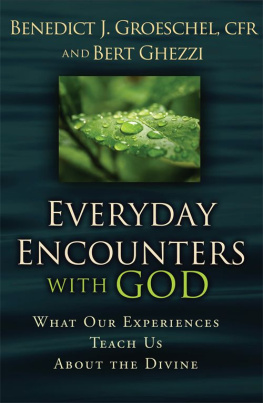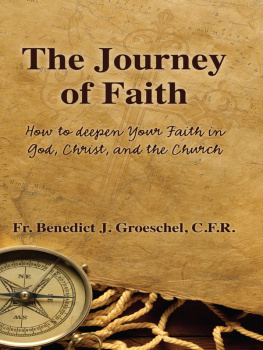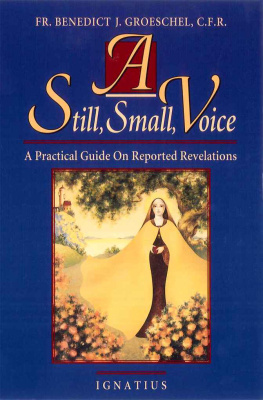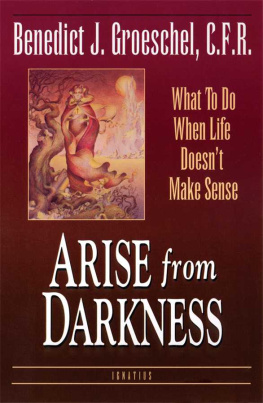Benedict Groeschel - Everyday Encounters with God: What Our Experiences Teach Us About the Divine
Here you can read online Benedict Groeschel - Everyday Encounters with God: What Our Experiences Teach Us About the Divine full text of the book (entire story) in english for free. Download pdf and epub, get meaning, cover and reviews about this ebook. year: 2008, publisher: The Word Among Us Press, genre: Religion. Description of the work, (preface) as well as reviews are available. Best literature library LitArk.com created for fans of good reading and offers a wide selection of genres:
Romance novel
Science fiction
Adventure
Detective
Science
History
Home and family
Prose
Art
Politics
Computer
Non-fiction
Religion
Business
Children
Humor
Choose a favorite category and find really read worthwhile books. Enjoy immersion in the world of imagination, feel the emotions of the characters or learn something new for yourself, make an fascinating discovery.
- Book:Everyday Encounters with God: What Our Experiences Teach Us About the Divine
- Author:
- Publisher:The Word Among Us Press
- Genre:
- Year:2008
- Rating:5 / 5
- Favourites:Add to favourites
- Your mark:
- 100
- 1
- 2
- 3
- 4
- 5
Everyday Encounters with God: What Our Experiences Teach Us About the Divine: summary, description and annotation
We offer to read an annotation, description, summary or preface (depends on what the author of the book "Everyday Encounters with God: What Our Experiences Teach Us About the Divine" wrote himself). If you haven't found the necessary information about the book — write in the comments, we will try to find it.
Everyday Encounters with God: What Our Experiences Teach Us About the Divine — read online for free the complete book (whole text) full work
Below is the text of the book, divided by pages. System saving the place of the last page read, allows you to conveniently read the book "Everyday Encounters with God: What Our Experiences Teach Us About the Divine" online for free, without having to search again every time where you left off. Put a bookmark, and you can go to the page where you finished reading at any time.
Font size:
Interval:
Bookmark:
E VERYDAY
E NCOUNTERS
WITH G OD
W HAT O UR E XPERIENCES
T EACH U S
ABOUT THE D IVINE
Before you the whole universe is as a grain from a balance,
or a drop of morning dew come down upon the earth.
W ISDOM 11:22 (NAB)
E NCOUNTERS
WITH G OD
W HAT O UR E XPERIENCES
T EACH U S
ABOUT THE D IVINE
B ENEDICT G ROESCHEL, CFR,
AND B ERT G HEZZI

2008 Benedict Groeschel, CFR, and Bert Ghezzi
All rights reserved.
Published by The Word Among Us Press
7115 Guilford Road
Frederick, Maryland 21704
www.wau.org
ISBN: 978-1-59325-139-0
eISBN: 978-1-59325-408-7
Cover Design by John Hamilton Design
No part of this publication may be reproduced, stored in a retrieval system, or transmitted in any form or by any meanselectronic, mechanical, photocopy, recording, or any other, except for brief quotations in printed reviewswithout the prior permission of the publisher.
Acknowledgments are on .
Library of Congress Cataloging-in-Publication Data
Groeschel, Benedict J.
Everyday encounters with God : what our experience teaches about the divine / Benedict Groeschel and Bert Ghezzi.
p. cm.
Includes bibliographical references.
ISBN 978-1-59325-139-0 (alk. paper)
1. Spiritual life--Christianity. 2. Experience (Religion) I. Ghezzi, Bert. II.
Title.
BV4501.3.G747 2008
242--dc22
2008022126
WITH G OD
As we make our way through life, we are often unaware that God is sending us messages each and every minute of the day. All around us, signs and reminders of God are to be seen. God also speaks to us constantly in our thoughts and inner life. Everywhere the voice of God very gently calls us to turn to him.
We may say, Im not aware of such a thing. Of course, thats true of almost all of us. Even though we may have been devout believers all our lives, we may not be sensitive enough to the persistent and ever-present call of God. And a reason we are not aware of Gods communicating to us is that we may not watch and listen carefully enough. Thats why Jesus challenged us by asking, Do you have eyes, and fail to see? Do you have ears, and fail to hear? (Mark 8:18). So the purpose of this book is to awaken us to the countless ways God is speaking to us every day.
Long ago Jacopone di Todi (d. 1306), a great medieval Franciscan poet, said that we live as people locked in a castle, and that God tries to break through to us by appealing to our sight, hearing, sound, touch, and even smell. The more we become aware that Gods love pursues us in this way, the more we will experience the richness of the mercy he wants to show us. And as we let God touch our spirits through our senses, we will begin to practice that mysterious art called contemplation. Contemplation is nothing more than a constant awareness of the presence of God as we go about our daily lives.
In recent years, there has been a great deal of writing and interest in contemplation. This is all for the best. However, too often people are preoccupied with mastering techniques of contemplative prayer. We need to be occupied with listening to God and not simply listening to ourselves. Paying attention to Gods voice is the essence of contemplation. He can speak to us through our desires and our inner experiences as well as through the world around us. God is calling us, and the basic technique of contemplative prayer is to learn how to listen to him.
In this book, we will explore different ways that God is communicating to us. (The author of the chapter will be identified at the end of the selection.) We have written about our world, our humanness, our relationships, our experiences, our spirituality, our life in the Christian community, and much more. A reflection question has been included to provide you with a way to pray and meditate on that specific way that you can encounter the Lord. In addition, each of the five sections ends with additional questions so that you can gather with others to discuss the issues that are raised.
Our hope is that our witness will open you to the numerous and diverse ways God is trying to get your attention. For as St. Paul declared to the Athenians, In him we live and move and have our being (Acts 17:28). God gives us all that we have. He joins with us, not only in the beautiful aspects of life, but also in our trials and troubles. His coming to us is called grace. This is a book about how to recognize the call of Gods grace in our lives.
B ENEDICT J. G ROESCHEL , CFR
B ERT G HEZZI
T HE N ATURAL W ORLD T ELLS U S ABOUT G OD
Ever since the creation of the world his eternal power and divine nature, invisible though they are, have been understood and seen through the things he has made.
R OMANS 1:20
Almost everyone thinks of St. Francis of Assisi as someone who found God in nature. And it is certainly true that St. Francis, particularly in his beautiful Canticle of the Sun, shows a person eminently sensitive to Gods call in the material world. Here, for example, he praises the sun, moon, and stars. O Lord, sings Francis, omnipotent and good!
We honor, praise, and bless you as we should....
To you be praise through all that you have done
Through creatures all, and first through Brother Sun!
Of you he is a symbol, beauteous, bright;
He makes the day and gives us warmth and light.
Praise too through Sister Moon and evry Star
Which you have made to shine in Heavn afar.
St. Bonaventure, who succeeded St. Francis as general of the Franciscans, also discerned the divine in nature and wrote a lovely book called The Footprints of God in Creation.
However, many of us dont live in close proximity to the natural world in its purist form. We live in towns and cities. We are surrounded by artifacts. Sometimes we sit in a room where there isnt a single thing in its natural statewhere everything has been manufactured. Maybe the closest we can get is a cold winter night, sitting in front of a fireplace where the logs, and nothing else, came from nature.
The sterility of our urban environments explains why people seeking to be contemplatives often have chosen to live in rural places. Monasteries and convents are frequently built in the woods or the wilderness. What about the rest of us who have to drive on the freeways or take the bus or the subway? Where can we find Gods presence, power, and beauty reflected in nature?
When he was in a Nazi concentration camp, Viktor Frankl, the renowned psychiatrist and author of Mans Search for Meaning, said that the only thing that reminded him of God and reality was the sky. The Nazis had not taken away the clouds by day and the stars by night. And so, he turned his thoughts and senses to the sky where he could perceive the beauty of God. Thankfully, most of us are not in such a situation.
The sky, the sea, the sunset, the sunrise, or the earth around us can astonish us with the beauty of God. While you are reading this book, I urge you to find a little piece of the natural world, even if you live in a big city. It may be that you have the prairie outside your window, a pond across the street, a park down the block, or maybe you only have a window box. But stop and look at what God has made.
People become confused and imagine that God made the world much like a contractor builds a house. But God works differently. He creates things in an evolutionary way. Thus, St. Augustine reminds us that God has put into all things the seeds of their growth, development, and ultimate reality. He taught that God made the world like a bud that opens gradually and follows the pattern of life that it had in its most seminal form. Look around you, and you will see not only the beauty of what God has made but the intricacy with which he has made it.
Next pageFont size:
Interval:
Bookmark:
Similar books «Everyday Encounters with God: What Our Experiences Teach Us About the Divine»
Look at similar books to Everyday Encounters with God: What Our Experiences Teach Us About the Divine. We have selected literature similar in name and meaning in the hope of providing readers with more options to find new, interesting, not yet read works.
Discussion, reviews of the book Everyday Encounters with God: What Our Experiences Teach Us About the Divine and just readers' own opinions. Leave your comments, write what you think about the work, its meaning or the main characters. Specify what exactly you liked and what you didn't like, and why you think so.







